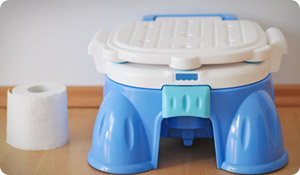
See what people are saying about this article on our Facebook page!![]()
The memorable first word. The adorable first step. The gleaming first tooth.
Unlike other firsts in your precious little one's life, the first time he uses the toilet isn't really a milestone at all. That's because potty training is a process, one that can seem endless and frustrating for parents at times.
And since there's wide variability in the age at which kids get trained, it's easy to grow envious if your friend's child is completely trained long before your child displays even a little interest in the process.
So what's normal and what's not? Here's what to keep in mind as you go through the potty training process.
It's normal for there to be a huge difference in the age at which your child gets trained.
Most kids are ready to start the process between 22 and 36 months, says Michael Assel, MD, assistant professor in the Children's Learning Institute at the University of Texas Health Science Center at Houston.
Boys master the skill later than girls by about two months, he says. "Kids on a faster developmental track may complete potty training around 2 years of age and those on a slower, but still average, trajectory would master potty training between 36 and 39 months," Assel notes.
It's normal for certain home situations to delay a child's success at potty training.
"If there's something going on in the family like a divorce, or someone is very ill, this can really delay the process," says Cheryl Wu, MD, of LaGuardia Place Pediatrics in New York City. Once the situation is resolved, it's likely that your child will get right back on track.
It's normal to have nighttime wetting up to the age of 4 or 5.
Don't be surprised if nights continue to be a challenge for many kids, says Wu. By the time your child is this age, she's old enough to talk with you about any fears she may have. Let her express her feelings, try to downplay failures by avoiding criticism, and if she's getting teased by siblings, put a firm end to that once and for all. Insist, with no exceptions, that she use the toilet before bedtime. Remind her how grown up she'll feel once she is staying dry all night.
It's normal for kids to be afraid to sit on the toilet.
Since the actual toilet can actually be quite terrifying to some kids, be sure to invest in a potty. Since even these can be scary to some kids, proceed slowly with the process. Try putting your child's favorite doll or stuffed animal on the potty so your child sees how easy it is.
Let your child pick out her own "big kid" underwear. To familiarize your child with the toilet, try letting her flush bits of paper so she can see how it works. Institute a "gold star" system in which she gets a star on her chart whenever she's successful on the potty.
It's not normal for a parent to force toilet training.
"A recipe for disaster is a parent or teacher trying to force toilet training on a child who is not ready," Assel says. "Coercing a child usually results in a frustrated caregiver." Parents should watch for signals of readiness, he says. These include an interest in parental bathroom use, the ability to stay dry for at least two hours, a predictable bowel schedule, a dislike of wet or soiled diapers, the motor coordination to remove diapers and clothing, and the cognitive and language skills necessary to understand and respond to instructions.
It's not normal for kids at the age of 5 to still not be toilet trained during the day.
Most kids are done with the process by around age 4, says Pio Andreotti, Psy.D., of Long Island College Hospital in New York City. "If your child is 5 and not trained, he should be evaluated by a doctor and get checked out physically to make sure there are no problems," he says.
See what people are saying about this article on our Facebook page!![]()





